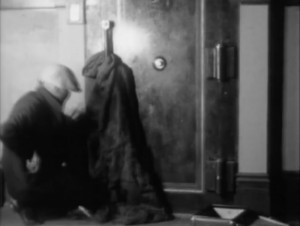
"Mystery romance in which the police chief's daughter is courted by a crook." Library and Archives Canada.
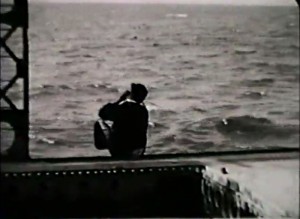
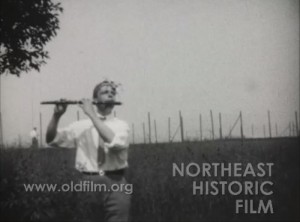
"Period piece of 1920's starring Roger Clapp and Dorothy Stebbins." Northeast Historic Film.
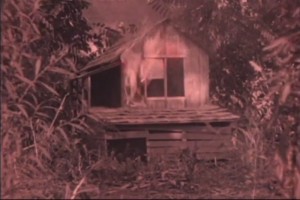
"Supernatural thriller made by a teenage girl." Filmpreservation.org
"15 year old Mary is bored. With her parents permission she writes her chum Martha to come for summer vacation and they will make a movie. In the meantime two convicts escape from the nearby prison. To frighten the girls away the convicts decide to play ghosts. Film ends with posse, capture and hand colored inferno." Oregon Historical Society.
"British cine amateur Donald S. James aided by Maureen Cottle has produced a tightly-knit comedy depicting three methods of capturing a burglar. In each episode, the same burglar enters the same home, but in each case, different methods are taken by the householders to effect his capture. The low key lighting is very effective and good editing has resulted in very professional results on the screen. Narration and sound effects on the recorded track round out the superior treatment of this better than average amateur effort." American Cinematographer, May. 1951, 192.
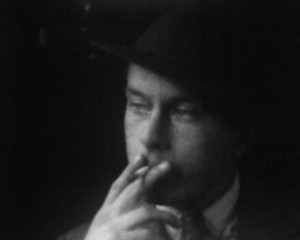
"On board the Cambridge Express, René Gade - 'Fresh from France' - travels to meet his cousin, a Cambridge don. To pass the journey, he gazes from the train window and puffs on his cigarette. Meanwhile, amidst the magnificent surrounds of King's College Cambridge, Gade's cousin - U. Wood, BA - is hard at work in the Old Lodge. Arriving at Cambridge, Gade disembarks from the train with a stumble. Later, with his car broken down on a country lane, Gade argues with the driver. A fiendish-looking passer-by offers to help, but steals the car. Nonplussed, Gade and the driver continue their journey on foot. Elsewhere, Archibald - the 'Archduke of Piffleheim' - is locked in an embrace with a young women, only to be startled by the appearance of Hecuba Brown, 'a pretty taking wench'. Succumbing to Brown's allure, he dumps his girl by pulling her leg (literally). Meanwhile, Gade and his driver spot a pair of young ladies walking down the lane. Following close behind, the pair make their move, grabbing a girl each and heading off in opposite directions" (EAFA Database).
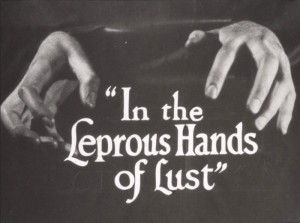
"The story is a burlesque of the anti social activities of a vice ring. The film contains some excellent interior lighting and is remarkably well edited." Movie Makers, April 1931, 224.
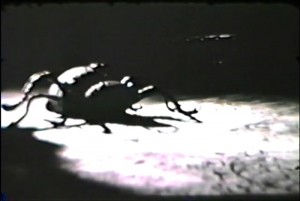
Horror film involving a family, a lodger, and the lodger's spiders.
"King Bookie: John Cowart set himself a tremendous goal in undertaking the production of this dramatic film, which has to do with bank robbers. But thanks to his zeal, his all around ability in movie making, the sincerity and cooperation of his amateur cast, and the cooperation of local merchants who happily contributed the use of their business establishments for locations, he has turned out a highly creditable production. The picture opens with a girl, unwittingly involved in the robbery, relating to an attorney events of the story which is pictured in retrospect. King Bookie is an underworld character who plots the crime, involves several others, some of whom meet death by his gun when the proceeds are retrieved from one gang member who sought to double-cross King Bookie. Narration, dialogue and musical score are a commendable effort of sound-on-film recording." American Cinematographer, May. 1951, 190.
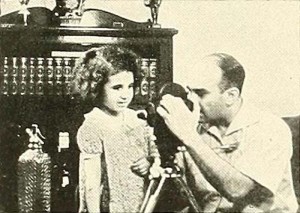
"Already well in the forefront of contemporary photoplay producers, Charles J. Carbonaro has taken a marked step onward in his current comedy, Little Sherlock. Simply planned yet smoothly integrated, this new production tells a delightful tale of the precocious daughter of a photographer, who was always "helping" father. How, during a surprise robbery of their home, she records the crux of the event with Daddy's amateur movie camera provides a denouement which is both satisfying and successful. In Little Sherlock, Mr. Carbonaro has more than maintained the suave lighting and impeccable technical standards for which his work is known; he now wins new honors with a display of genuine talent for light comedy direction. To both of these credits must be added praise for his own acting of the busy cameraman and for the portrayal of the eager apprentice by his own daughter, Alice." Movie Makers, Dec. 1937, 603.
Total Pages: 4